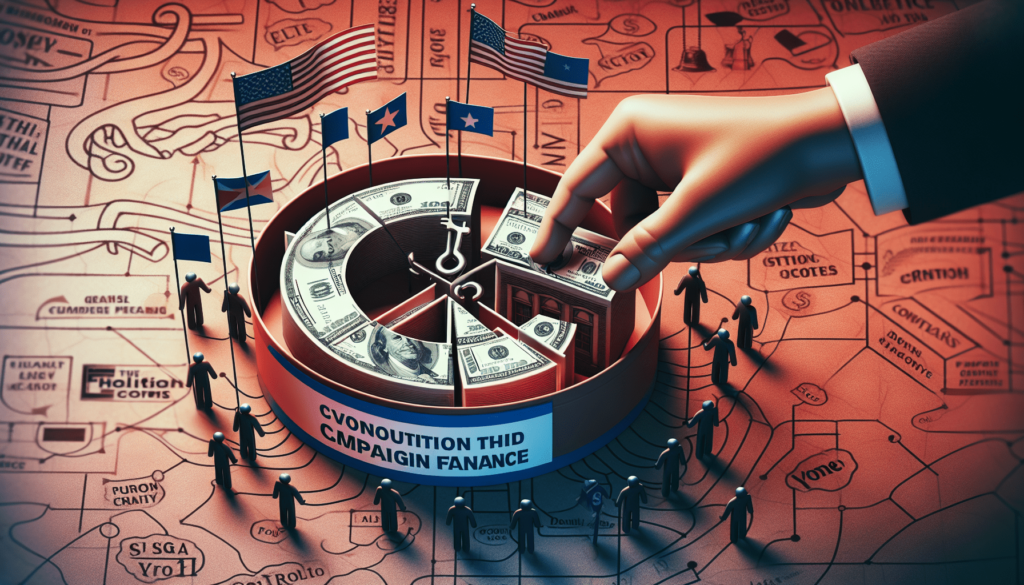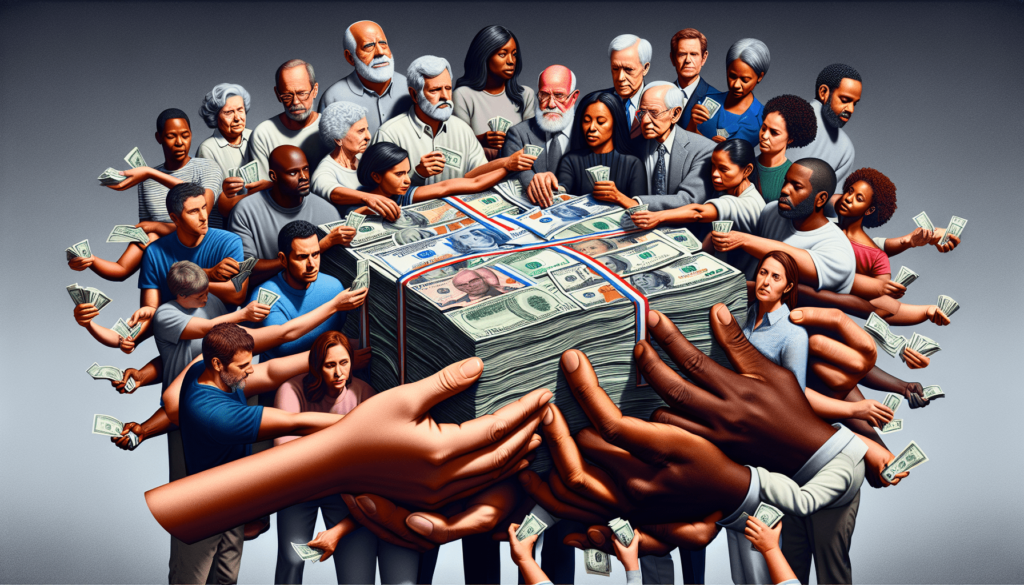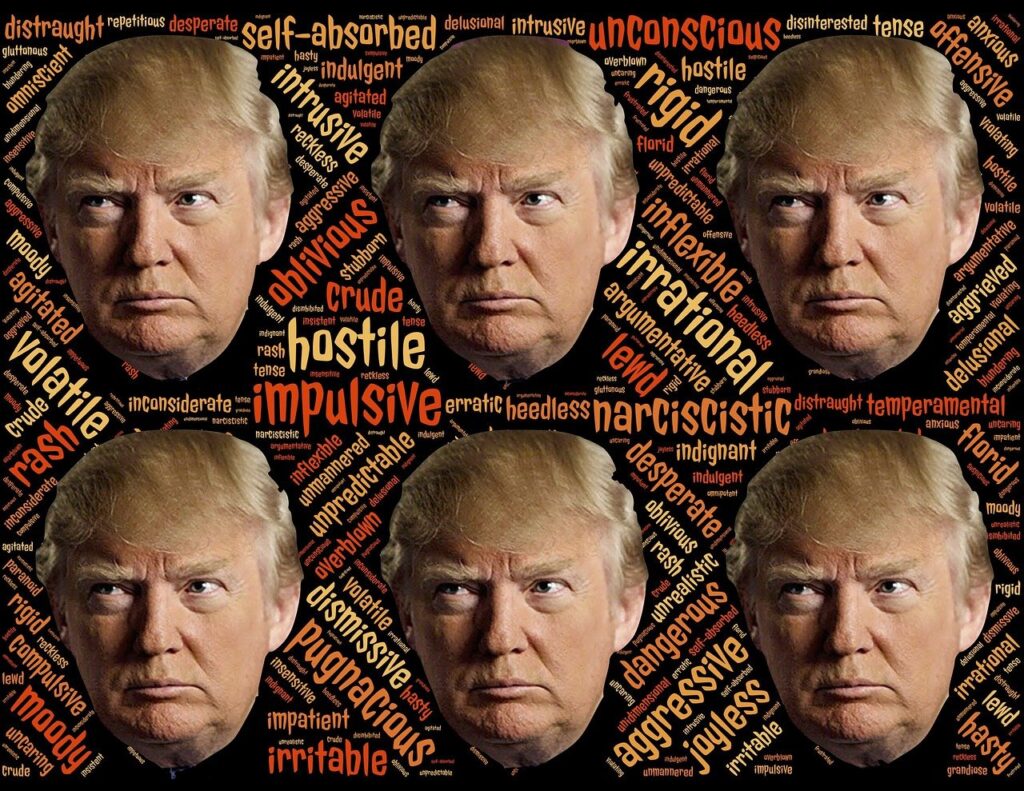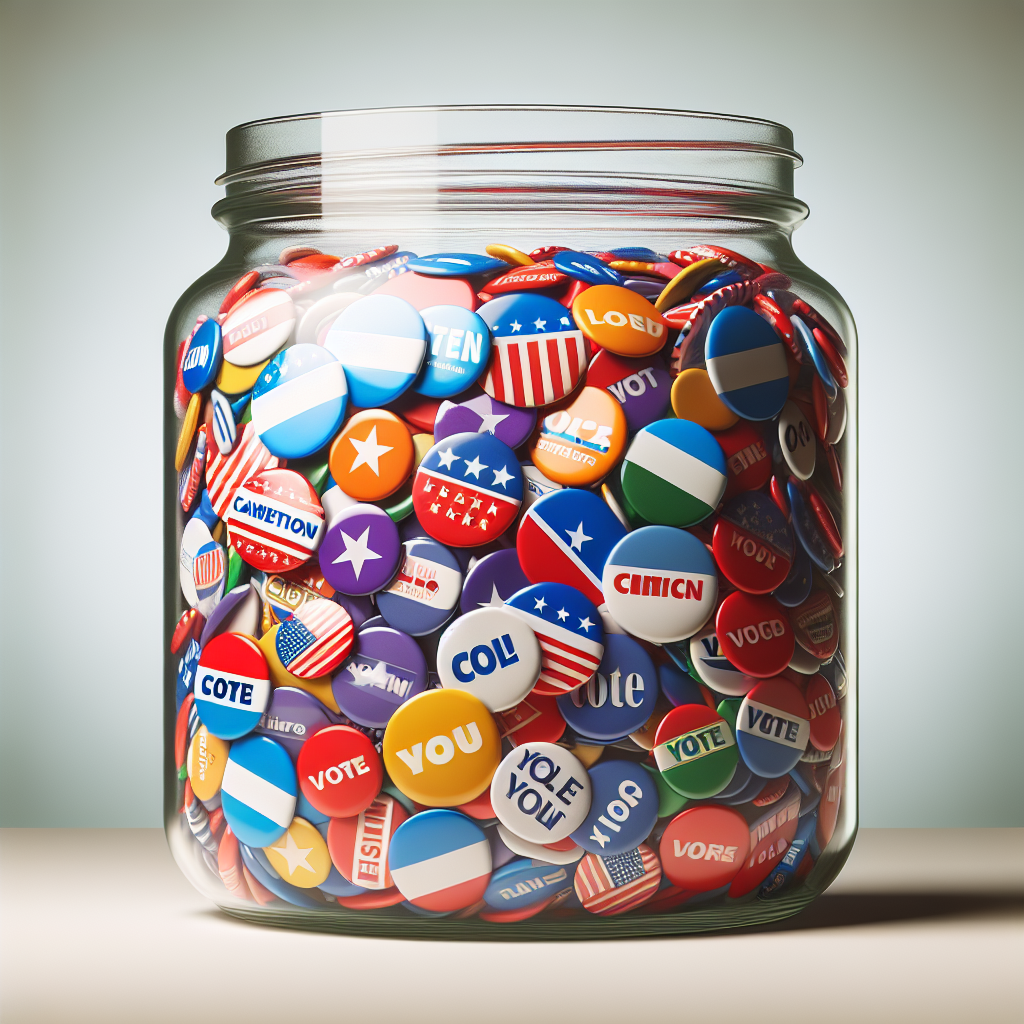In the realm of political campaigns, the intriguing question arises: How do candidates manage to finance their primary campaigns? It’s a topic shrouded in curiosity for many, as the financial aspect of running for office can often seem overwhelming. From fundraising efforts to personal investments, candidates employ a myriad of strategies to secure the necessary funds for the intensive battle ahead. In this article, we’ll explore the various avenues candidates take to finance their primary campaigns, shedding light on the intricate world of political financing and the tactics employed by aspiring politicians like yourself.
Individual Contributions
Limits and Regulations
When it comes to financing primary campaigns, one of the most common sources of funds is individual contributions. As a candidate, you can rely on the support of individuals who believe in your cause and want to see you succeed. However, it’s important to understand that there are limits and regulations in place to ensure transparency and prevent corruption.
The Federal Election Campaign Act (FECA) sets limits on the amount of money individuals can contribute to a primary campaign. As of 2022, the individual contribution limit is $2,900 per election, meaning that an individual can donate up to $2,900 for the primary and another $2,900 for the general election. Additionally, there are aggregate limits that prevent individuals from contributing more than a total amount, which is currently set at $5,800 per election cycle.
To maintain transparency in the campaign finance process, candidates are required to disclose information about their individual contributors. This includes the donor’s name, address, occupation, and employer. These guidelines ensure that the public has access to information about who is financing a candidate’s campaign and helps prevent any potential conflicts of interest.
Fundraising Events
Another effective way for candidates to finance their primary campaigns is through fundraising events. These events provide an opportunity for supporters to gather and contribute to the campaign, while also allowing the candidate to connect with their base and share their message.
Fundraising events can come in various forms, from intimate gatherings in supporters’ homes to larger-scale events held at venues such as hotels or convention centers. They often involve speeches from the candidate, as well as opportunities for attendees to ask questions and engage in personal conversations. These events can be ticketed, with attendees making a financial contribution to gain access, or they can rely on the generosity of attendees to make voluntary donations.
When organizing fundraising events, it’s important for candidates to consider their target audience and tailor the event to appeal to their supporters. This could mean hosting themed events that align with the candidate’s platform or values or choosing a venue that holds significance for the community. By creating a memorable and engaging experience, candidates can inspire their supporters to contribute to their primary campaign.
Online Donations
With the advancement of technology, online donations have become an increasingly popular method for candidates to finance their primary campaigns. Through the use of secure websites and payment processors, supporters can easily contribute to a candidate’s campaign with just a few clicks.
Online donations offer convenience for both candidates and supporters. Supporters can contribute to a candidate’s primary campaign from the comfort of their own homes, at any time that is convenient for them. Candidates, on the other hand, can easily track and manage online donations, allowing them to have a real-time understanding of the financial support they are receiving.
To encourage online donations, candidates often leverage social media and email campaigns to reach a wider audience. By sharing their campaign platform and goals, candidates can inspire individuals to contribute to their primary campaign. Additionally, many online platforms and payment processors offer the option for recurring donations, allowing supporters to make regular contributions over an extended period of time.
Bundling
Bundling refers to the practice of individuals or organizations collecting contributions from multiple supporters and presenting them to a candidate as one large donation. This method of financing primary campaigns can be particularly useful for candidates aiming to attract major donors or individuals who may surpass the individual contribution limits.
Bundling allows individuals to leverage their personal relationships and networks to raise significant amounts of money for a candidate’s primary campaign. By combining multiple contributions into one large donation, bundlers can make a more substantial impact on the candidate’s overall fundraising efforts. This method also provides an opportunity for supporters who may not have the means to make substantial individual contributions to still contribute to a candidate’s campaign.
To ensure transparency and compliance with campaign finance regulations, candidates are required to disclose information about bundlers who raise significant amounts of money. This helps maintain transparency in the campaign finance process and prevents any potential conflicts of interest.
Political Action Committees (PACs)
Definition and Role
Political Action Committees, commonly known as PACs, play a significant role in financing primary campaigns. PACs are organizations that are formed to raise and spend money to support or oppose political candidates. These committees can be created by individuals, corporations, labor unions, or other organizations with shared political interests.
The primary role of PACs is to aggregate contributions from multiple sources and use these funds to support candidates who align with their political objectives. PACs can directly contribute to a candidate’s campaign, engage in independent expenditures to advocate for or against a candidate, and fund issue-oriented advertisements and campaigns.
By pooling resources and strategically directing funds, PACs can have a substantial influence on the outcome of primary campaigns. They provide candidates with financial support and can help amplify their message through campaign advertisements and grassroots organizing efforts.
Super PACs
Super PACs, also known as independent expenditure-only committees, are a specific type of PAC that emerged as a result of the Supreme Court’s Citizens United decision in 2010. Unlike traditional PACs, Super PACs are not limited in the amount of money they can raise from individuals, corporations, or labor unions.
One of the key distinctions of Super PACs is that they cannot contribute directly to candidates or coordinate with their campaigns. Instead, Super PACs focus on independent expenditures and issue advocacy. This allows them to spend unlimited amounts of money on advertisements, communications, and other campaign activities as long as they do not directly coordinate with the candidate.
Super PACs have had a significant impact on primary campaigns, as they can raise and spend substantial sums of money to support or oppose candidates. Their ability to engage in independent expenditures without contribution limits provides them with considerable financial influence in the political landscape.
Donation Limits and Regulations
While PACs and Super PACs are valuable tools for financing primary campaigns, it’s important to note that there are limits and regulations that govern their financial activities. PACs are subject to contribution limits, similar to individual contributions, meaning that they must comply with the maximum donation amounts set by the Federal Election Campaign Act.
Super PACs, on the other hand, can accept unlimited contributions from individuals, corporations, and labor unions. However, they are required to disclose information about their donors, ensuring transparency in the campaign finance process.
To maintain the integrity of the campaign finance system, candidates and campaigns must operate independently from PACs and refrain from coordinating their activities. This helps prevent any potential influence or corruption that may arise from direct coordination between candidates and PACs.
In addition to contribution limits and coordination rules, PACs and Super PACs must adhere to reporting requirements set by the Federal Election Commission (FEC). This includes disclosing information about their expenditures, contributions, and financial activities, allowing the public to have access to information about their financial support of candidates.
Party Committees
National Party Committees
National party committees play a vital role in financing primary campaigns. These committees, which include the Democratic National Committee (DNC) and the Republican National Committee (RNC), raise and distribute funds to support party candidates in primary elections.
National party committees can provide financial resources to candidates in the form of direct contributions, as well as in-kind contributions such as staff support, training, and other campaign resources. These committees often focus on supporting candidates who align with the party’s platform and have a strong likelihood of success in the primary election.
Party committees also play a key role in fundraising efforts, leveraging their networks and connections to raise funds from individual donors, PACs, and other organizations. They often hold fundraising events and engage in targeted outreach to generate financial support for their endorsed candidates.
State and Local Party Committees
In addition to national party committees, state and local party committees also play a significant role in financing primary campaigns. These committees, which operate at the state, county, and local levels, work to build and maintain party infrastructure within their respective jurisdictions.
State and local party committees play a critical role in grassroots organizing efforts, assisting candidates in voter outreach, volunteer recruitment, and campaign messaging. This support can significantly impact a candidate’s ability to fundraise for their primary campaign, as it provides them with additional resources and expertise.
Party committees at the state and local levels are also involved in fundraising activities, engaging in efforts to raise financial resources to support their endorsed candidates. They can leverage their connections with local businesses, community organizations, and individual donors to generate support for primary campaigns.
Overall, party committees, both at the national and state/local levels, offer candidates a valuable source of financial support and infrastructure, helping to strengthen their primary campaigns and increase their chances of success.
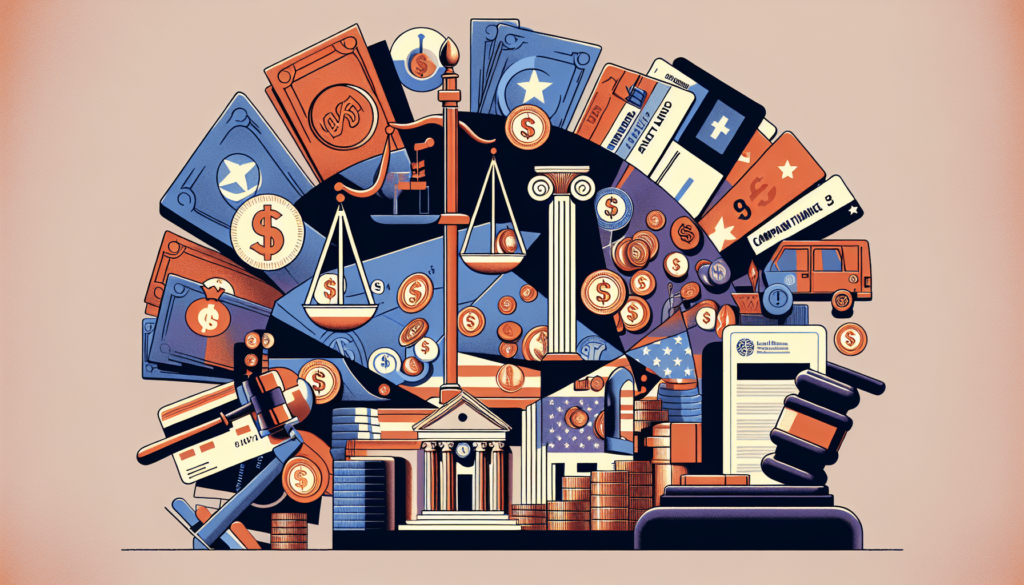
Public Funding
Eligibility and Requirements
Public funding provides candidates with an alternative option for financing their primary campaigns. Through the public funding program, candidates can receive government funds to support their campaigns, reducing their reliance on private contributions.
To be eligible for public funding, candidates must meet certain criteria and fulfill specific requirements. These criteria are designed to ensure that candidates have a genuine chance of success and are committed to participating in the public funding program.
The eligibility requirements for public funding may include demonstrating a threshold level of public support, such as receiving a minimum number of qualifying contributions from individual donors. Candidates may also be required to limit their campaign spending and adhere to financial restrictions set by the program.
Presidential Primary Matching Payment Account
One specific aspect of public funding is the Presidential Primary Matching Payment Account. This program provides matching funds to eligible presidential candidates who agree to limit their campaign spending and comply with the program’s rules.
Candidates participating in the Presidential Primary Matching Payment Account program can receive up to $250 in matching funds for each contribution they receive from an individual donor. However, there are limits on the total amount of matching funds a candidate can receive, which is determined based on a formula established by the Federal Election Commission.
The Presidential Primary Matching Payment Account program aims to promote fairness and encourage candidates to rely on grassroots support and small-dollar contributions. It provides an additional avenue for candidates to access financial resources and compete in the primary election on a more level playing field.
Limits and Regulations
While public funding can provide candidates with a valuable source of financial support, it’s important to note that there are limits and regulations in place to ensure the integrity of the program.
Candidates participating in public funding programs are subject to spending limits, which are determined based on factors such as the candidate’s party affiliation, the population of the jurisdiction they are running in, and the inflation rate. These spending limits are designed to prevent candidates from having an unfair advantage due to receiving public funds.
Candidates must also adhere to reporting requirements set by the program, disclosing information about their campaign expenditures, contributions, and compliance with the program’s rules. This ensures transparency and accountability in the use of public funds, allowing the public to have access to information about how candidates are utilizing these resources.
Overall, public funding offers candidates an alternative path for financing their primary campaigns, providing them with financial support while promoting fairness and transparency in the electoral process.
Self-Financing
Personal Wealth
Self-financing is a strategy that some candidates use to finance their primary campaigns. This involves using personal wealth, such as savings, investments, or assets, to fund their campaign expenses.
Candidates who have significant personal wealth can choose to invest their own money into their primary campaigns, eliminating the need to rely on external financial support. This can provide candidates with a considerable advantage, as they have the resources to fund their campaign activities without the constraints imposed by contribution limits or fundraising efforts.
However, self-financing does come with challenges. While personal wealth can provide candidates with initial financial support, it may not be a sustainable long-term solution. Campaigns can be expensive, and candidates may find it challenging to solely rely on their personal resources to fund all the necessary expenses.
Moreover, self-financing can raise concerns about the influence of personal wealth in politics, potentially creating an imbalance between candidates who can afford to self-finance and those who rely on grassroots fundraising or other sources of support.
Loans
In addition to personal wealth, candidates can also choose to finance their primary campaigns through loans. Candidates can secure loans from banks, financial institutions, or even personal acquaintances to cover campaign expenses.
Loans can provide candidates with immediate access to funds that will allow them to finance their primary campaigns while awaiting the receipt of other sources of financial support. This can be particularly useful for candidates who have limited personal wealth or who may not have immediate access to other funding options.
However, it’s important to note that loans are subject to repayment, typically with interest. Candidates must carefully consider their ability to repay the loans, taking into account the uncertainties and challenges associated with running a primary campaign and the potential impact on their personal finances.
Campaign Expenditure Limitations
While self-financing can provide candidates with a certain degree of financial independence, it’s important to understand that there are limitations on campaign expenditures. Candidates must adhere to spending limits set by campaign finance regulations, regardless of the source of their funds.
Campaign expenditure limitations ensure fairness and prevent candidates from gaining an unfair advantage through excessive spending. These limitations vary based on factors such as the jurisdiction, the office being sought, and the type of election.
Candidates must carefully manage their campaign expenses, ensuring that they stay within the prescribed limits to avoid penalties or other consequences. This requires effective budgeting, strategic allocation of resources, and efficient campaign management.
Overall, self-financing can provide candidates with initial financial support and flexibility, but it’s essential for candidates to carefully consider the long-term sustainability of this approach and adhere to campaign expenditure limitations.
Small Donor Matching Programs
Eligibility and Requirements
Small donor matching programs are designed to incentivize candidates to focus on grassroots fundraising and encourage individuals to make small-dollar contributions to political campaigns. These programs provide candidates with matching funds for qualifying donations from individual donors.
Eligibility for small donor matching programs often includes meeting certain criteria, such as raising a minimum threshold amount from a specified number of individual contributors. Candidates must also adhere to specific rules and reporting requirements set by the program to qualify for matching funds.
The objective of small donor matching programs is to reduce the influence of large donations and promote the engagement of everyday citizens in the campaign finance process. By amplifying the impact of small-dollar contributions, these programs aim to create a more equitable campaign finance system.
Matching Ratios
Small donor matching programs typically use matching ratios to determine the amount of funds that will be provided for each qualifying small-dollar contribution. These ratios vary depending on the program and jurisdiction but are often designed to provide a multiplier effect for grassroots contributions.
For example, a matching ratio of 6:1 means that for every $1 raised from a small-dollar contribution, the candidate receives an additional $6 in matching funds. This incentivizes candidates to actively seek grassroots support and engage with a broader range of individual donors.
Matching ratios can vary based on factors such as the size of the contribution, the timing of the donation, or whether the donor is a local resident. These variations aim to maximize the impact of small-dollar contributions and encourage candidates to focus on building a broad base of grassroots support.
Limits and Regulations
While small donor matching programs offer candidates an opportunity to amplify the impact of small-dollar contributions, it’s important to note that there are limits and regulations in place to ensure transparency and prevent abuse of the system.
Candidates participating in small donor matching programs must adhere to contribution limits set by the program. This ensures that individuals cannot exploit the system by making multiple small-dollar contributions to receive matching funds beyond what is intended.
Candidates must also comply with reporting requirements, disclosing information about their campaign expenditures, contributions, and compliance with the program’s rules. This transparency allows the public to have access to information about how candidates are utilizing matching funds and ensures accountability in the use of these resources.
Overall, small donor matching programs provide candidates with an incentive to engage with grassroots supporters and promote the participation of everyday citizens in the campaign finance process.
Corporate and Union Contributions
Limits and Regulations
Corporate and union contributions play a significant role in financing primary campaigns, but there are limits and regulations in place to ensure transparency and prevent undue influence.
Under the Federal Election Campaign Act, corporations and unions are prohibited from making direct contributions to federal candidates. However, they can establish separate entities known as Corporate Political Action Committees (PACs) and Union PACs to engage in political fundraising and make contributions to candidates.
Corporate and Union PACs are subject to contribution limits, similar to individual contributors. As of 2022, the contribution limit for corporate PACs and union PACs to a candidate’s primary campaign is $5,000 per election.
To ensure transparency, candidates are required to disclose information about the corporate and union PACs that contribute to their campaigns. This includes the PAC’s name, address, and the total amount contributed. These disclosure requirements help prevent any potential conflicts of interest and allow the public to have access to information about the entities supporting a candidate’s primary campaign.
Corporate Political Action Committees (PACs)
Corporate Political Action Committees (PACs) are established by corporations and are one way for companies to engage in political fundraising and support primary campaigns. Corporate PACs can solicit donations from employees, shareholders, and executives and use these funds to make contributions to candidates who align with the company’s interests.
Corporate PACs enable businesses to pool resources and collectively support primary campaigns that promote their objectives and policy positions. These PACs often prioritize candidates who are friendly to their industries and can advocate for policies that benefit their organizations.
While corporate PACs can provide significant financial support to primary campaigns, it’s important to note that candidates must follow campaign finance regulations and adhere to contribution limits. Additionally, candidates must report contributions received from corporate PACs, ensuring transparency in the campaign finance process.
Fundraising Consultants and Firms
Role and Services
Fundraising consultants and firms play a crucial role in helping candidates finance their primary campaigns. These professionals have expertise in campaign finance laws, fundraising strategies, and donor communication, and can provide valuable guidance and support throughout the fundraising process.
Fundraising consultants and firms work closely with candidates to develop customized fundraising strategies tailored to their individual campaign goals and circumstances. They assist in identifying potential donors, organizing fundraising events, implementing online fundraising campaigns, and managing donor communication.
These professionals also provide expertise in compliance with campaign finance regulations, ensuring that candidates operate within legal and ethical boundaries. They assist in donor record-keeping, reporting requirements, and disclosure of campaign contributions, helping candidates maintain transparency and accountability in their fundraising efforts.
Campaign Finance Compliance
Campaign finance compliance is a crucial aspect of financing primary campaigns. Candidates must navigate a complex regulatory landscape, ensuring that they adhere to contribution limits, reporting requirements, and other regulations set by campaign finance laws.
Fundraising consultants and firms play a critical role in campaign finance compliance, providing candidates with guidance and support to meet regulatory obligations. They help candidates track and report contributions, maintain accurate financial records, and ensure timely filing of required reports with the appropriate government agencies.
By partnering with fundraising consultants and firms, candidates can focus on their campaign activities while having the confidence that their fundraising efforts are meeting legal requirements. This helps candidates maintain transparency, accountability, and public trust in their primary campaigns.
Grassroots Fundraising
Role of Volunteers
Grassroots fundraising relies on the support and effort of dedicated volunteers who are committed to assisting candidates in financing their primary campaigns. These volunteers play a vital role in mobilizing community support, engaging with potential donors, and organizing fundraising events.
Volunteers can champion a candidate’s platform and effectively communicate their message to potential donors. They serve as ambassadors for the campaign, sharing their enthusiasm and passion with others and inspiring them to contribute to the candidate’s primary campaign.
In addition to fundraising activities, volunteers can provide valuable support in other campaign efforts, such as voter outreach, door-to-door canvassing, and social media promotion. Their commitment and dedication contribute to the overall success of the primary campaign.
Door-to-Door Canvassing
Door-to-door canvassing is a grassroots fundraising strategy that involves candidates and volunteers personally reaching out to potential donors in their communities. This direct approach allows candidates to connect with individuals on a personal level and share their campaign message and goals.
When conducting door-to-door canvassing for fundraising purposes, candidates and volunteers can provide information about the campaign and ask for financial support. They can explain the importance of grassroots fundraising and how small-dollar contributions can make a significant impact on the campaign’s success.
Door-to-door canvassing not only generates financial support but also helps candidates build relationships with potential donors and establish a presence within the community. It allows candidates to listen to voters’ concerns, answer their questions, and gather feedback, creating a stronger connection between the candidate and the electorate.
Phone Banking
Phone banking is another effective grassroots fundraising strategy that allows candidates and volunteers to directly connect with potential supporters and ask for their financial contributions. This method involves making phone calls to individuals within targeted voter lists and engaging them in conversations about the campaign.
During phone banking, candidates and volunteers can explain the purpose of the call, share information about the campaign, and make a direct ask for financial support. They can provide convenient options for individuals to make contributions, such as directing them to the campaign’s website or offering to take down their donation information over the phone.
Phone banking not only raises funds for the primary campaign but also helps candidates identify potential supporters and build a database of individuals who are interested in contributing or getting involved. It serves as an opportunity to spread awareness about the campaign and engage individuals in the political process.
Social Media Campaigns
In the digital age, social media has become an integral component of grassroots fundraising. Candidates and volunteers can leverage social media platforms to reach a wide audience, share campaign updates, and make appeals for financial contributions.
Social media campaigns can involve various strategies, such as creating compelling content, sharing personal stories, hosting live videos, and actively engaging with followers. These efforts help candidates cultivate an online presence, attract new supporters, and inspire them to contribute to their primary campaigns.
By utilizing targeted advertisements and sharing donation links, candidates can direct potential supporters to their fundraising platforms, making it easy for individuals to contribute with just a few clicks. Social media campaigns also encourage supporters to share campaign messages with their networks, amplifying the fundraising efforts through word-of-mouth and organic reach.
Social media fundraising campaigns provide candidates with an effective tool to connect with a broad audience, build brand recognition, and generate financial support for their primary campaigns.
Political Fundraising Organizations
Role and Services
Political fundraising organizations play an essential role in supporting candidates’ primary campaigns. These organizations, often nonprofit entities, are dedicated to assisting candidates in raising funds to support their campaign activities.
Political fundraising organizations provide candidates with a range of valuable services. They offer fundraising training and education, helping candidates develop effective strategies, understand campaign finance regulations, and build relationships with potential donors.
These organizations often have established donor networks and can connect candidates with potential financial supporters. They have expertise in donor research and can provide insights into donors’ giving patterns and preferences, assisting candidates in tailoring their fundraising outreach.
Additionally, political fundraising organizations may offer specialized services such as donor database management, fundraising event planning, and online fundraising platform support. These services help candidates streamline their fundraising efforts and maximize their potential for success in financing their primary campaigns.
Political Fundraising Training
Political fundraising training is a critical component of candidates’ preparation for financing their primary campaigns. Training programs offered by political fundraising organizations provide candidates with the knowledge and skills necessary to navigate the complexities of campaign finance laws and build successful fundraising strategies.
Fundraising training equips candidates with an understanding of the legal requirements and compliance obligations associated with campaign finance. It teaches them how to identify potential donor pools, tailor their fundraising messages, and effectively communicate their campaign goals.
Training programs also focus on donor cultivation and engagement, providing candidates with insights into donor psychology and the tactics that are most likely to elicit financial support. Candidates learn how to host successful fundraising events, engage with donors through various channels, and build long-term relationships with their supporters.
Overall, political fundraising training empowers candidates to take control of their fundraising efforts, expand their networks, and build a solid foundation for financing their primary campaigns.
In conclusion, financing primary campaigns involves a multifaceted approach that draws on various sources, strategies, and regulations. Individual contributions, fundraising events, online donations, and bundling provide candidates with avenues to secure financial support from their supporters. Political Action Committees, including Super PACs, play a significant role in aggregating contributions and supporting candidates aligned with their political objectives. Party committees, both at the national and state/local levels, offer financial resources and infrastructure to candidates. Public funding, self-financing, small donor matching programs, and corporate and union contributions are additional methods that candidates can utilize. Fundraising consultants and firms provide guidance and support in campaign finance compliance and fundraising strategies. Grassroots fundraising efforts, led by volunteers, leverage door-to-door canvassing, phone banking, and social media campaigns to engage supporters and generate financial contributions. Political fundraising organizations offer services and training programs to assist candidates in raising funds for their primary campaigns. With a comprehensive understanding of these financing options and regulations, candidates can effectively navigate the complex landscape of campaign finance and successfully finance their primary campaigns.
https://motorcitytennis.net/how-do-candidates-finance-primary-campaigns/

